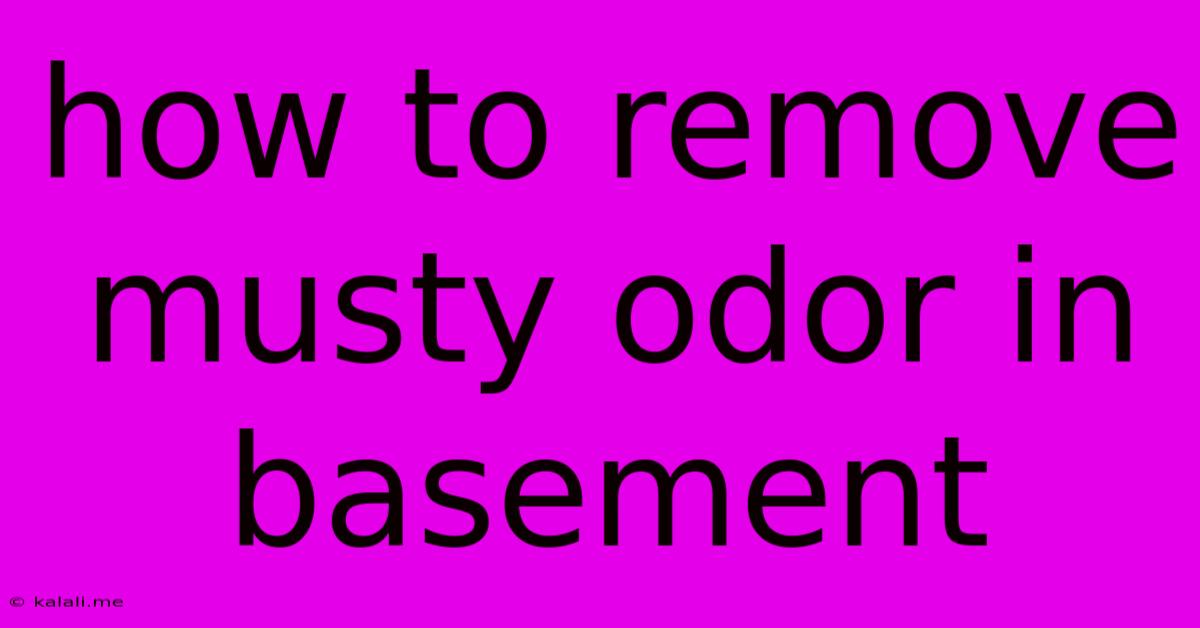How To Remove Musty Odor In Basement
Kalali
May 27, 2025 · 3 min read

Table of Contents
How to Remove Musty Odor in Your Basement: A Comprehensive Guide
A musty smell in your basement is more than just unpleasant; it can be a sign of underlying moisture problems and even potential health hazards like mold growth. This comprehensive guide will walk you through effective strategies to eliminate that musty odor and prevent its return, ensuring a fresh and healthy basement environment. We'll cover everything from simple cleaning techniques to addressing the root causes of the problem.
Understanding the Source of the Musty Smell
Before tackling the odor, it's crucial to identify its source. A musty smell often indicates the presence of mold, mildew, or excess moisture. Common culprits include:
- Leaks: Check for leaks in pipes, windows, or the foundation. Even small leaks can contribute to significant moisture buildup over time.
- Poor Ventilation: Insufficient airflow allows moisture to accumulate, creating the perfect breeding ground for mold and mildew.
- High Humidity: Basements are naturally prone to higher humidity levels. Without proper dehumidification, the musty smell will persist.
- Water Damage: Previous flooding or water damage can leave behind lingering moisture and mold spores, resulting in a persistent musty odor.
- Organic Materials: Stored cardboard boxes, wood, or other organic materials can absorb and retain moisture, contributing to the musty smell.
Effective Methods to Eliminate Musty Basement Odors
Once you've identified the source, you can begin the odor removal process. This often involves a multi-pronged approach:
1. Cleaning and Dehumidification:
- Thorough Cleaning: Start by thoroughly cleaning the entire basement. Use a solution of water and a mild detergent or a specialized mold and mildew cleaner to scrub walls, floors, and any affected surfaces. Pay close attention to cracks and crevices where moisture can accumulate.
- Dehumidification: Invest in a dehumidifier to reduce the moisture levels in your basement. Run it regularly, especially during humid seasons, to prevent mold and mildew growth. Empty the dehumidifier frequently to maintain its efficiency.
- Ventilation: Improve ventilation by opening windows whenever possible (weather permitting) and using exhaust fans. Consider installing a dedicated basement ventilation system for optimal airflow.
2. Addressing Moisture Problems:
- Repair Leaks: Promptly repair any leaks you discover to prevent further moisture buildup. Contact a plumber or contractor if necessary.
- Improve Drainage: Ensure proper drainage around the foundation of your house to prevent water from seeping into the basement. This might involve grading the soil or installing drainage systems.
- Seal Cracks: Seal any cracks in the foundation or walls to prevent moisture from entering.
3. Odor Neutralization Techniques:
- Baking Soda: Place open containers of baking soda throughout the basement to absorb odors. Baking soda is a natural odor absorber and is safe for use around pets and children.
- Activated Charcoal: Activated charcoal is another effective odor absorber. Place bowls of activated charcoal in affected areas.
- White Vinegar: Place bowls of white vinegar around the basement. The acetic acid in vinegar helps neutralize odors, but be mindful of the strong smell.
- Air Purifiers: Consider using an air purifier with a HEPA filter to remove mold spores and other airborne particles that contribute to the musty smell. Look for models specifically designed for basements or damp environments.
4. Preventative Measures:
- Regular Cleaning: Regularly clean your basement to prevent the buildup of dust, debris, and moisture.
- Proper Storage: Store items in airtight containers to prevent them from absorbing moisture and odors.
- Moisture Monitoring: Use a hygrometer to monitor humidity levels and adjust dehumidification accordingly.
By following these steps, you can effectively eliminate musty odors from your basement and create a healthier, more pleasant living space. Remember, persistent musty smells often indicate a larger moisture problem, so addressing the root cause is crucial for long-term odor control. If you're unsure about any aspect of this process, consult with a professional for assistance.
Latest Posts
Latest Posts
-
Thermal Conductivity Vs Heat Transfer Coefficient
May 28, 2025
-
Adhesive For Ceramic Tile To Wood
May 28, 2025
-
31 2 Year Ministry Of Jesus
May 28, 2025
-
When Should Spark Plugs Be Replaced
May 28, 2025
-
How Did The Eldian King Make Ymir Work For Him
May 28, 2025
Related Post
Thank you for visiting our website which covers about How To Remove Musty Odor In Basement . We hope the information provided has been useful to you. Feel free to contact us if you have any questions or need further assistance. See you next time and don't miss to bookmark.